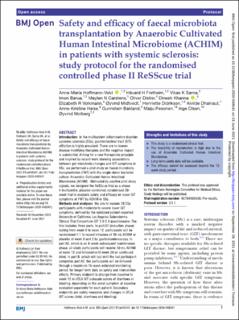| dc.contributor.author | Hoffmann-Vold, Anna-Maria | |
| dc.contributor.author | Fretheim, Håvard Halland | |
| dc.contributor.author | Sarna, Vikas Kumar | |
| dc.contributor.author | Barua, Imon Shoumitra | |
| dc.contributor.author | Carstens, Maylen N. | |
| dc.contributor.author | Distler, Oliver | |
| dc.contributor.author | Khanna, Dinesh | |
| dc.contributor.author | Volkmann, Elizabeth R. | |
| dc.contributor.author | Midtvedt, Øyvind | |
| dc.contributor.author | Didriksen, Henriette | |
| dc.contributor.author | Dhainaut, Alvilde | |
| dc.contributor.author | Halse, Anne Kristine Hjorteseth | |
| dc.contributor.author | Bakland, Gunnstein | |
| dc.contributor.author | Pesonen, Maiju | |
| dc.contributor.author | Olsen, Inge Christoffer | |
| dc.contributor.author | Molberg, Øyvind | |
| dc.date.accessioned | 2023-01-04T15:07:51Z | |
| dc.date.available | 2023-01-04T15:07:51Z | |
| dc.date.created | 2021-08-06T15:20:24Z | |
| dc.date.issued | 2021 | |
| dc.identifier.citation | BMJ Open. 2021, 11 (6), . | en_US |
| dc.identifier.issn | 2044-6055 | |
| dc.identifier.uri | https://hdl.handle.net/11250/3041038 | |
| dc.description.abstract | Introduction In the multisystem inflammatory disorder systemic sclerosis (SSc), gastrointestinal tract (GIT) affliction is highly prevalent. There are no known disease modifying therapies and the negative impact is substantial. Aiming for a new therapeutic principle, and inspired by recent work showing associations between gut microbiota changes and GIT symptoms in SSc, we performed a pilot study on faecal microbiota transplantation (FMT) with the single-donor bacterial culture ‘Anaerobic Cultivated Human Intestinal Microbiome (ACHIM)’. Motivated by positive pilot study signals, we designed the ReSScue trial as a phase II multicentre, placebo-controlled, randomised 20-week trial to evaluate safety and efficacy on lower GIT symptoms of FMT by ACHIM in SSc.
Methods and analyses We aim to include 70 SSc participants with moderate to severe lower GIT symptoms, defined by the validated patient-reported University of California Los Angeles Scleroderma Clinical Trial Consortium GIT 2.0 2.0 questionnaire. The trial includes three parts. In part A1 (induction phase) lasting from week 0 to week 12, participants will be randomised 1:1 to repeat infusions of 30 mL ACHIM or placebo at week 0 and 2 by gastroduodenoscopy. In part A2, which is an 8-week subsequent maintenance phase, all study participants will receive 30 mL ACHIM at week 12 and followed until week 20 on continued blind. In part B, which will last until the last participant completes part A2, the participants will be followed through a maximum 16-week extended monitoring period, for longer-term data on safety and intervention effects. Primary endpoint is change from baseline to week 12 in UCLA GIT subscale scores of diarrhoea or bloating, depending on the worst symptom at baseline evaluated separately for each patient. Secondary endpoints are safety measures and changes in UCLA GIT scores (total, diarrhoea and bloating). | en_US |
| dc.language.iso | eng | en_US |
| dc.publisher | BMJ Publishing Group | en_US |
| dc.rights | Navngivelse-Ikkekommersiell 4.0 Internasjonal | * |
| dc.rights.uri | http://creativecommons.org/licenses/by-nc/4.0/deed.no | * |
| dc.title | Safety and efficacy of faecal microbiota transplantation by Anaerobic Cultivated Human Intestinal Microbiome (ACHIM) in patients with systemic sclerosis: Study protocol for the randomised controlled phase II ReSScue trial | en_US |
| dc.type | Peer reviewed | en_US |
| dc.type | Journal article | en_US |
| dc.description.version | publishedVersion | en_US |
| dc.source.pagenumber | 0 | en_US |
| dc.source.volume | 11 | en_US |
| dc.source.journal | BMJ Open | en_US |
| dc.source.issue | 6 | en_US |
| dc.identifier.doi | 10.1136/bmjopen-2020-048541 | |
| dc.identifier.cristin | 1924447 | |
| cristin.ispublished | true | |
| cristin.fulltext | original | |
| cristin.qualitycode | 1 | |

